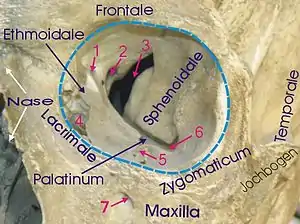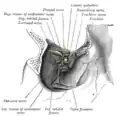Inferior orbital fissure
The lateral wall and the floor of the orbit are separated posteriorly by the inferior orbital fissure which transmits the zygomatic branch of the maxillary nerve and the ascending branches from the pterygopalatine ganglion. The infraorbital vessels are found in the inferior orbital fissure, and travel down the infraorbital groove into the infraorbital canal and exit through the infraorbital foramen. Inferior division of ophthalmic vein passes through the inferior orbital fissure.
| Inferior orbital fissure | |
|---|---|
 The skull from the front. (Label for inferior orbital fissure is at center right.) | |
 1 Foramen ethmoidale, 2 Canalis opticus, 3 Fissura orbitalis superior, 4 Fossa sacci lacrimalis, 5 Sulcus infraorbitalis, 6 Fissura orbitalis inferior, 7 Foramen infraorbitale | |
| Details | |
| Identifiers | |
| Latin | Fissura orbitalis inferior |
| TA98 | A02.1.00.084 |
| TA2 | 489 |
| FMA | 54802 |
| Anatomical terminology | |
It is formed by the sphenoid bone and maxilla.
Images
 Left infratemporal fossa.
Left infratemporal fossa. Horizontal section of nasal and orbital cavities.
Horizontal section of nasal and orbital cavities. Dissection showing origins of right ocular muscles, and nerves entering by the superior orbital fissure.
Dissection showing origins of right ocular muscles, and nerves entering by the superior orbital fissure. Inferior orbital fissure.
Inferior orbital fissure.
References
This article incorporates text in the public domain from page 189 of the 20th edition of Gray's Anatomy (1918)
External links
| Wikimedia Commons has media related to Inferior orbital fissure. |
- lesson3 at The Anatomy Lesson by Wesley Norman (Georgetown University) (orbitforamina) (#3)
- "Anatomy diagram: 34256.000-1". Roche Lexicon - illustrated navigator. Elsevier. Archived from the original on 2012-12-27.
- "Anatomy diagram: 34257.000-1". Roche Lexicon - illustrated navigator. Elsevier. Archived from the original on 2012-07-22.
This article is issued from Wikipedia. The text is licensed under Creative Commons - Attribution - Sharealike. Additional terms may apply for the media files.